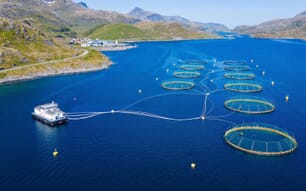New figures published by HMRC show that both volume and values of Scottish salmon exports during the first quarter of 2020 fell by 40 per cent and 34 per cent respectively, compared to the same period in 2019.
In total, 13,600 tonnes of Scottish salmon were exported, worth £100 million. This represents a decline in volume of 8,900 tonnes and a reduction in value of over £51 million in the period compared with 2019.
The export decline was felt sharply in March, as coronavirus took hold in several major markets. The value of exports totalled £24.1 million, a decline from £31.7 million in February and 57 per cent lower than March 2019.
The closure of the vitally important food service sector in many export markets, significantly reduced passenger flights to key markets like the USA and consequent spikes in freight charges and an emerging trend to buy local in many European countries have all been factors in the export decline.
According to the Scottish Salmon Producers Organisation (SSPO) the sector is showing great resilience in its operations and farmers have worked hard to keep their key workers safe and livestock healthy. But, with the likelihood that quarter two export figures will also be lower than pre-Covid expectations, focus is shifting from the early operational challenges faced by farmers to the much-needed support required to re-enter and kick-start and develop export sales.
Julie Hesketh-Laird, chief executive of the SSPO, said: “As our export markets gradually open we look to the UK and Scottish Governments to help find ways to ensure supply lines to customers are kept open and are competitive so the UK’s biggest food export can be enjoyed in our key markets. The much-needed support being considered for the aviation sector must focus on freight as well as passengers. High quality Scottish salmon is available and we want to see significantly more flights leaving the UK with salmon in their hold. We operate in a highly competitive, global market and want to hold fast to our market share, which brings economic benefits to local and national economies.
“In the longer term we need easy access to markets through a swift and fair conclusion to free-trade negotiations with our biggest and most important trading partners in the EU and USA. Support from Governments to make this happen is critically important now, more than ever.
“At home, the dynamics of consumer shopping and consumption are changing radically. This is an important opportunity for Governments to get behind the promotion of healthy, nutritious, locally produced food. Campaigns that encourage healthy eating and buying locally produced fish would clearly benefit fish farmers and consumers.”



